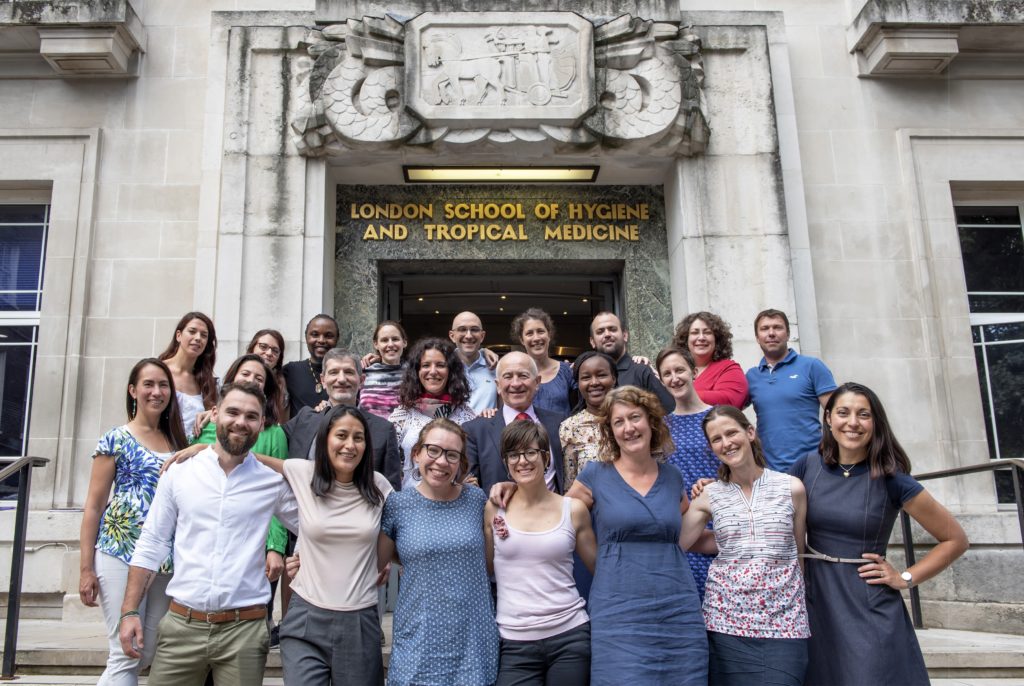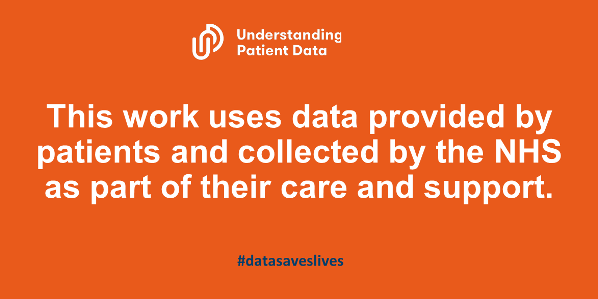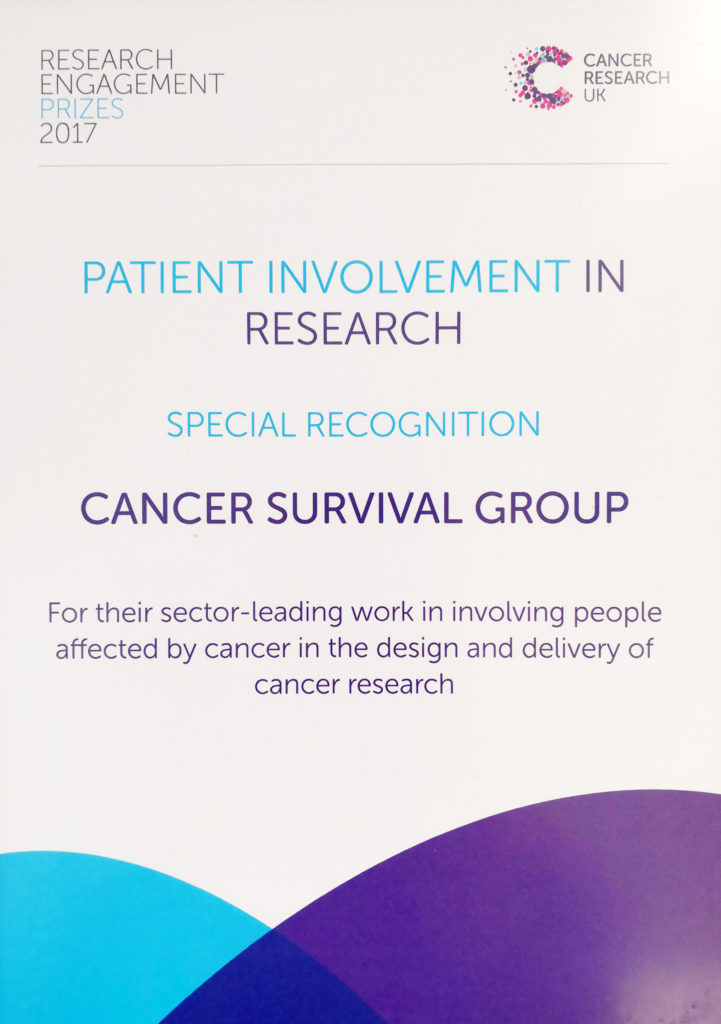What we do
We are the Cancer Survival Group, a vibrant group of some 30 researchers from 15 countries. We have been examining trends and inequalities in cancer survival in the UK and other countries for 20 years.

The cancer research that we do is called epidemiology. This is the study of health and disease in populations, or public health. Our research is designed to improve the care and survival for all patients with cancer, by providing evidence to inform local, national and international strategies for cancer control.
We examine data about patients with cancer in order to publish reports, statistics, tables and graphs that help us identify patterns in cancer survival, such as whether patients living in less wealthy areas of the country have unexpectedly low survival from cancer. But we always need to remind ourselves that every line of data, every entry in a medical record or hospital database, relates to an individual person on their journey with cancer.
We analyse data about individual patients with cancer to build up a statistical picture of survival. We do this under legal oversight from the Health Research Authority (see Security and confidentiality). It is important to note that the data we use are completely anonymous. The original data are collected by population-based cancer registries, which record a basic set of data about everyone diagnosed with a cancer who lives in the region or country that they cover. This produces information about how many patients are diagnosed each year with each type of cancer (incidence), and the chances of survival up to (say) 5 or 10 years after diagnosis. Our statistics do not give the chances of survival for any individual patient. They show the average survival for patients with the same or similar characteristics, such as age, sex, area of residence or type of treatment. Then we can study why survival differs between these groups of cancer patients.
Cancer registries have been in operation in the UK since the 1960s. They are the source of all information about trends in cancer incidence and survival. In our research, we use data provided by cancer registries in the UK and many other countries.
Our research
The public is familiar with cancer research involving clinical trials of new drugs or treatments. Clinical trials provide crucial evidence about whether a new treatment is better than previously available treatments. With the exception of children, however, most patients with cancer are not included in clinical trials.
Epidemiological research provides evidence about survival of all patients with cancer. For example, we can examine how survival differs between patients who are diagnosed at a very early stage of disease and those whose cancer has spread to other parts of the body. We can examine differences in survival by age at diagnosis, or between men and women (or boys and girls), or between different areas of the country. We also examine trends in survival over time, and differences in cancer survival between many countries world-wide.
What we do is called “observational research” because, unlike clinical trials (interventional research), we do not diagnose or treat patients, although some of us are medically qualified. Instead, we use data about patients with cancer to find the origin of inequalities in cancer survival, so that patients can be diagnosed more quickly and their access to treatment and care can be improved. Our overall aim is to provide population-based evidence for strategies to improve survival for all patients with cancer.
This type of research has underpinned every national cancer strategy in the UK since 1995. For example, the National Awareness and Early Diagnosis Initiative, launched in 2008, was prompted by our research showing that poor survival in the UK was partly attributable to late diagnosis. The most recent cancer strategy for England, Achieving world-class cancer outcomes (2015), was designed “to improve radically the outcomes that the NHS delivers for people affected by cancer”.

The anonymous cancer patient data that we analyse for England have often been enriched by linkage to other data, such as the Hospital Episode Statistics and clinical audit datasets, within the National Cancer Registration and Analysis Service in Public Health England. The linked datasets are obtained from PHE’s Office for Data Release. These data enable us to explore trends and inequalities in cancer survival in greater detail.
For a broader view of cancer research at the London School of Hygiene and Tropical Medicine, see the blog here.
We work with people who have had cancer
Patients with cancer tell us forcefully that they want their data to be used for research, safely and confidentially, to improve the lives of all patients with cancer. Advocacy groups such as “use MY data” and Understanding Patient Data have made the same point.
We have worked with cancer survivors since 2000. Cancer survivors sit on our external advisory panels, helping to guide our research.
Since 2011, we have also worked with people who are living with cancer, and carers, in the National Cancer Research Institute’s Consumer Forum. We have attended and hosted their Dragon’s Den sessions, in which we discuss our research with members of the Forum and get invaluable input and advice. The NCRI Consumer Forum was the first patient group in the world to endorse the CONCORD programme for the global surveillance of cancer survival, led by the Cancer Survival Group.

Margaret Grayson MBE, a breast cancer survivor in Belfast, has allowed us to use a film of her electrifying speech at a cancer conference in 2015. In just 5 minutes, she makes the case very powerfully that data about individual patients with cancer should be used more widely in research, to improve the outcomes for all patients [you can see her speech here].
In 2017, the Cancer Survival Group was awarded special recognition by Cancer Research UK in its Research Engagement prizes: “For [our] sector-leading working in involving people affected by cancer in the design and delivery of cancer research”.
In November 2018, we coordinated a workshop in Newcastle entitled: “Their cancer journeys: artistic expressions of living with cancer”.The workshop brought together researchers, people affected by cancer and a local artist. Through the creative process of mono-printing, we explored ways to express feelings and share experiences of how cancer had affected our lives. Public exhibitions of the prints produced during the workshop have highlighted that no two people deal with a cancer diagnosis in the same way. This was a unique and effective way of improving mutual understanding between health researchers and people affected by cancer.
Our research is richer as a result of these interactions. As Richard Stephens, until recently Chair of the NCRI Consumer Forum, puts it: “Our group includes many cancer survivors. These are OUR data that are being used; it’s not an abstract point of principle, it’s practical.”
The right to use NHS services is normally associated with the responsibility to allow use of the anonymised data for research, to help other patients in future. All such research is subject to prior approval by the statutory Health Research Authority and an NHS Research Ethics Committee. Patients who prefer not to have their data used for research in this way can register their objection on the NHS Digital web-site, here.
Security and confidentiality
All of our research using data about patients with cancer is approved by the Confidentiality Advisory Group of the Health Research Authority. The HRA is the UK’s statutory body that oversees access to health data for research, under prevailing law (Data Protection Act 2018, NHS Act 2006 and the European Union’s General Data Protection Regulation 2016). These approvals are in the public domain on the HRA web-site.
All our research is also approved by NHS Research Ethics Committees. It is also approved by the Ethics Committee at the London School of Hygiene and Tropical Medicine.
Before our permissions to hold data about patients with cancer are renewed, we are required to submit annual reports on each of these approvals, for evaluation.
We have completed a Data Protection Impact Assessment, under guidance from the Information Commissioner’s Office.
We also maintain our own internal security policy, to ensure that we maintain the physical and electronic security of the data that we hold. This policy forms part of our Data Security and Protection Toolkit, which is published and approved by NHS Digital.
Last updated on 13 November 2021

